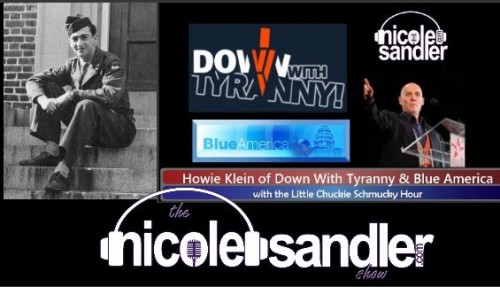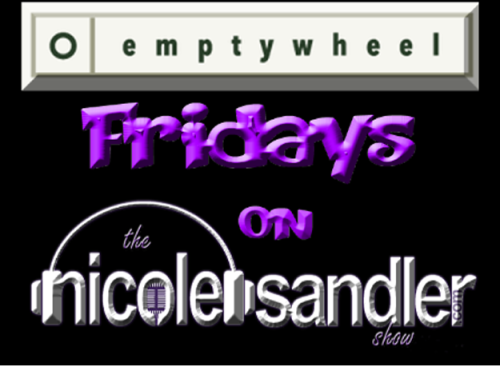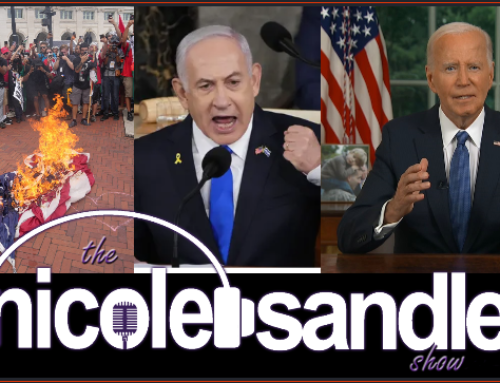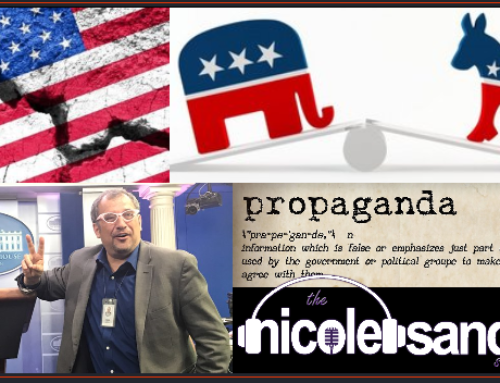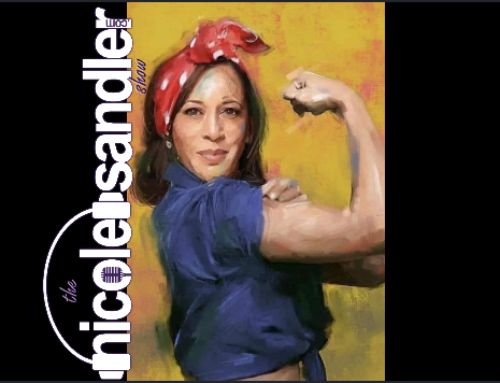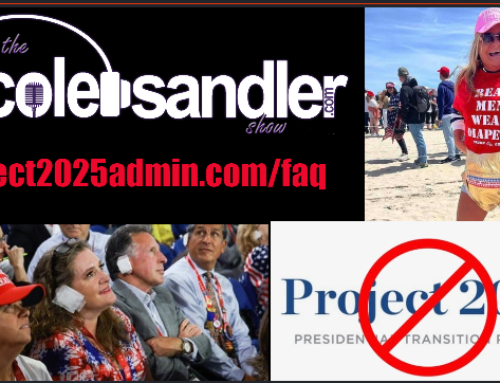Download here or click below to play, (or watch the video at the bottom of the page!)
Things are getting stranger and stranger, and it feels like the nation is one simmering pressure cooker. Between the Rittenhouse trial and the trial for the murderers of Ahmaud Arbery going on at the same time the House select committee on 1/6 seems to be kicking into action, and some of the more hardcore of the insurrectionists are finally being sentenced to more than a slap on the wrist, the American right wing seems to be more empowered than ever. And we have an Attorney General who just can’t seem to rise to the occasion. That’s where Howie Klein and I will start today when he joins in for our regular Thursday afternoon get-together. Where we’ll wind up is to be determined…
Well, we actually started with music, as I gave my review of the Jackson Browne/James Taylor show we saw last night. (Short version: Amazing!) But I asked Howie about the article in today’s Washington Post, headlined “What Happened to Eric Clapton?”
What grabbed Cray’s attention was the second verse.
Do you wanna be a free man
Or do you wanna be a slave?
Do you wanna be a free man
Or do you wanna be a slave?
Do you wanna wear these chains
Until you’re lying in the grave?
Cray — one of the great blues guitarists of his generation, a five-time Grammy winner and Black man born in segregated Georgia — emailed Clapton immediately. Was the 76-year-old guitar great comfortable singing Morrison’s words, which compared the lockdown to slavery?
“His reaction back to me was that he was referring to slaves from, you know, England from way back,” Cray says.
That didn’t satisfy Cray. Neither did their next email exchange. Then Cray stopped replying altogether. The next time he wrote was weeks later to politely inform Clapton that he couldn’t, in good conscience, open for him as planned on an upcoming tour.
After that, Cray watched as Clapton released two more lockdown songs, conducted a lengthy interview with vaccine skeptics, and pledged to perform only where fans would not be required to be vaccinated, or, as Clapton said in a statement, not “where there is a discriminated audience present.”
After a September show in Austin, Clapton posed backstage with Texas Gov. Greg Abbott. Abbott had recently signed the country’s most restrictive abortion law and a Republican-backed measure to limit who can vote in the state. Like that, a 35-year friendship was over.
“There’s this great photo [from 2013] at Madison Square Garden after the show, with B.B. King sitting in a chair, Jimmie Vaughan, myself and Eric sitting behind him,” Cray says. “And I looked at that picture of Gov. Abbott, Jimmie Vaughan and Eric Clapton in that similar pose, and I’m going, what’s wrong with this picture? Why are you doing this?”
Many of Clapton’s friends and fans are asking that same question. Before the pandemic, the guitarist and singer was one of rock’s elder untouchables, a multigenerational hitmaker with the same draw and standing as Billy Joel, James Taylor and Elton John. His 1992 album, “Unplugged,” remains the best-selling live release ever, with over 25 million copies sold. He is the only artist inducted three different times into the Rock and Roll Hall of Fame.
In an increasingly polarized world, Clapton stayed out of politics. He was never one to pop up at rallies or marches. So it’s been more than a departure to hear him questioning scientists on anti-vaccine websites.
“I’ve talked to other musicians, old friends of mine, these great players who, you know, will remain nameless in our conversation, who say, ‘What the f— is he doing?’” says producer Russ Titelman, whose credits include “Unplugged” and a new Clapton album that arrives this month, “Lady in the Balcony: Lockdown Sessions.”
“He’s the anti-Bono,” says Bill Oakes, who managed Clapton’s label throughout the 1970s. “He is the epitome of someone who is there for the music, and he’s never rubbed shoulders with world leaders and never wanted to.”
Interviews with more than 20 musicians and acquaintances who have known Clapton over the years, from his days in the Yardbirds to his most recent concerts in September, shed light on why he may have thrust himself into the covid debate. Among friends and collaborators, there’s hope that Clapton can repair the damage he’s done to his reputation. But their frustration is apparent.
“Nobody I’ve talked to that knows Eric has an answer,” says drummer Jim Keltner, who has known Clapton for 51 years. “We’re all in the same boat. We’re all going, ‘I can’t figure it out.’ ”
Earlier this year, when he heard Clapton complaining that his friends were abandoning him, Keltner wrote to tell him that many of them were just confused.
“It’s something that he brought upon himself,” Keltner says. “And so I’ve been hoping and praying really, that he can figure out a way to, I don’t say get out of it, but to make it go away somehow so that it doesn’t ultimately interfere with the music.”
It’s unclear how much Clapton cares about the criticism. He declined multiple interview requests for this article, and his business manager, Michael Eaton, explained that decision in an email to The Washington Post. Eaton wrote that “given the depressingly bad standard of journalism reflected in certain recent articles, Eric Clapton has no desire at the moment to engage with the US Press. Anyone in the public eye has to expect and accept negative comment, but it should be balanced.”
Eaton did clarify that Clapton’s photo with Abbott should not be interpreted as him supporting a ban on abortion, noting that “he is a great believer in freedom of choice which drives his position on vaccinations, and his views on other matters would reflect that belief in freedom of choice.”
Clapton’s general silence has left people to interpret his views through infrequent short statements, his anti-lockdown songs and a 24-minute video interview posted in June.
In the interview, Clapton talks about how he’s been attacked since he released “Stand and Deliver.”
“The minute I began to say anything about the lockdown, I was labeled as a Trump supporter in America,” he said.
He called Morrison “fearless” and mentioned that he tried to reach out to his own musician friends, “but I don’t hear from anyone. My phone doesn’t ring very often. I don’t get that many texts and emails anymore. It’s quite noticeable.”
Bassist Nathan East, who remains loyal to Clapton after decades in his band and is one of the performers on “Lady in the Balcony,” said that his wife and manager urged him to talk only if he could avoid discussing politics.
“I’ve done interviews for the last 40 years, but I think this is the most volatile position that we’ve seen from the press standpoint,” East says. “For me, the beauty of music is that it really transcends language, color and politics.”
For most of Clapton’s career, that’s been true.
He emerged in 1963 as the neck-tied, Telecaster-playing lead guitarist of the blues-inspired Yardbirds. Before long, as legend had it, spray-painted messages began appearing around London with a simple message: “Clapton is God.” When Clapton felt the Yardbirds started moving in too commercial a direction, he quit.
He joined John Mayall’s Bluesbreakers, pledging blues purity, then exited for Cream, growing an Afro and plugging in a wah-wah pedal. He formed and quit a British supergroup, Blind Faith, and then turned to Southern soul, touring as a member of Delaney & Bonnie. Obsessed with the organic sound of the Band, Clapton next formed Derek and the Dominos. They lasted for one critically acclaimed album.
“A chameleon in every way, not just in his appearance and reshaping himself and redoing his persona and taking his music to another place,” says keyboardist and singer Bobby Whitlock, who wrote or co-wrote seven songs on the lone Derek and the Dominos album from 1970.
This was the era of politically conscious pop music, from Crosby, Stills, Nash and Young’s “Ohio” to Marvin Gaye’s “What’s Going On.” But Clapton’s worldview didn’t extend beyond his fretboard.
He really had only one cause at the time: Wooing Pattie Boyd, a model who just happened to be married to his best friend, former Beatle George Harrison. “Layla,” the centerpiece of the Derek and the Dominos record, would be a plaintive plea for her love and remains a staple of Clapton’s concert repertoire.
“There’s an obsessive part, the same thing that made him really sit down and learn to play the guitar the way he did,” says Chris O’Dell, who served as an assistant for Harrison and then Clapton during that era. “He went after Pattie maybe the same way. Maybe obsessed is the wrong word, but you’re mono focused. You have only one thing in your mind, and that’s all you can really concentrate on.”
Eric Clapton, like so many, had a plan for 2020. He intended to do his semiregular residency at London’s Royal Albert Hall and record the performances. Then the lockdown struck, and the shows were canceled.
“Which from a selfish point of view is devastating because I’m of an age where I don’t know how long my faculties will go on,” Clapton said in the June interview.
Around that time, Clapton signed on for a Zoom chat with Jamie Oldaker, the Tulsa-based drummer who played on eight of his albums starting with 1974’s “461 Ocean Boulevard.” Oldaker had cancer; he would die in July. Richard Feldman, a mutual friend who co-wrote Clapton’s 1978 hit, “Promises,” was also on the call.
“At one point, I said, ‘Eric, how are you doing?’ ” Feldman says. “And he sounded kind of like a 17-year-old, if you will. He says, ‘I just don’t have anyone to play with.’ It was kind of real and heartfelt.”
This has emerged as the main theory as to why Clapton has responded so strongly to covid shutdowns. At 76 and with a long list of health problems — from nerve issues in his hands and legs to hearing loss — he can feel the clock ticking and is desperate to squeeze in as much playing as he can.
“That’s what he lives for,” Keltner says. “You can’t take [his] gigs away. It’s like breathing for him.”
Clapton got vaccinated in February. But he has been skeptical of government directives and has a lifelong fear of needles. As a heroin addict in the early 1970s, he would only snort the drug.
“I felt so alone,” Clapton said in the June interview. “I really couldn’t talk to my family or my kids. My teenagers seemed like they had been brainwashed.”
The first shot sidelined him for a week, delaying the “Lady” project. The second shot was worse.
“My hands and feet were either frozen, numb or burning, and pretty much useless for two weeks,” he said. “I feared I would never play again.”
Hearing this, singer Bonnie Bramlett, who first worked with Clapton when she was one half of Delaney & Bonnie, says that his response to vaccine mandates makes perfect sense.
“He can’t feel his freakin’ hands anymore and he doesn’t want that to happen to anyone else,” she says. “And why is everybody all freaked out about it? I think he’s a hero for it.”
But medical experts say that Clapton is more than one man sharing his opinion. He’s a massive public figure with considerable influence.
“He could be helping us in finishing off this pandemic, especially with a vulnerable population,” says Joshua Barocas, an associate professor of medicine with an expertise in infectious diseases at the University of Colorado School of Medicine. “We’re looking at millions and millions of people worldwide. He could be a global ambassador, and instead he’s chosen the pro-covid, anti-public-health route.”
Clapton’s hands eventually recovered enough for him to play again. That’s when he got in touch with Nathan East.
“He said, ‘If I put something together where we would, you know, set up a little bubble and we could just play and feel safe. Would you be up for doing it?’ ” East remembers.
Which is how they ended up in Cowdray House, a majestic manor in the middle of a polo club in West Sussex, England, recording what became “Lady in the Balcony.” It was the height of the pandemic, and East, after arriving, had to stay in touch with the police so they knew he was quarantining.
Titelman flew over to produce his first Clapton album since 1994’s “From the Cradle.” The band was impeccable, with East, keyboardist Chris Stainton and drummer Steve Gadd.
Clapton did not appear diminished. The performance, largely acoustic, showed off his still intact guitar chops and underrated voice, one that still allows him to sing his staples — “Layla,” “After Midnight” and “Tears in Heaven” — in the same key in which they were written. For East, the highlight of the performance was an intense, nearly eight-minute version of “River of Tears” from 1998’s “Pilgrim.”
“He sings his heart out, and I’ll never forget the chills I had,” East says.
They did not talk politics at Cowdray House, and “Lady” would include no between-song chatter about vaccines or lockdowns. But behind the scenes, Titelman found himself in an uncomfortable position. Clapton wanted to include “Stand and Deliver” alongside his classics. Titelman didn’t think much of the song musically. The subject worried him more. He thought it would distract from “Lady” and even prepared a speech he planned to deliver to Clapton if he insisted on including it.
“This is about music and performance and live music going on while we’re in the midst of this horrible pandemic,” Titelman planned to say. “So it’s everything you want to say to people. And if that thing’s on there, it’ll explode.”
In the end, the record label solved the problem. Titelman was told it didn’t want the song.
In the months after “Lady” was recorded, Clapton continued to create headlines with his covid chatter. He released another song with Morrison titled “The Rebels” and then “This Has Gotta Stop.” Clapton wrote the latter alone, and it had an accompanying animated video featuring a zombielike population manipulated by politicians and marching off to mindless factory jobs. “I can’t take this B.S. any longer,” he sang on the chorus. The message was not subtle.
The anti-lockdown campaign has unquestionably damaged Clapton’s reputation. In October, Rolling Stone magazine, which had featured him eight times on its cover in largely glowing terms in the past, produced a searing attack that not only called him out for his pandemic behavior, but spotlighted a 45-year-old incident that remains an inescapable bruise on his career.
The racist rant during a concert in Birmingham, England, in 1976 was not something newly surfaced. Clapton addressed it in 2017’s “Eric Clapton: Life in 12 Bars” documentary, and it’s been used regularly as ammunition against him online. As #BlackLivesMatter surged last year, acclaimed songwriter Phoebe Bridgers slammed Clapton in an interview as making “extremely mediocre music” and being “a famous racist.” In 2019, Living Colour guitarist Vernon Reid tweeted about his love of Clapton’s playing in Cream with the qualification that it’s “important not to sidestep the curious phenomena of Racist With The Blues.”
Clapton’s remarks came during a surge of immigration in the 1970s and a campaign on the far right to stop the flow of South Africans into Britain. Onstage, Clapton told his audience that it was important to “keep England White” and that “the Black wogs and coons and Arabs and f—ing Jamaicans don’t belong here.” In “12 Bars,” Clapton apologized and said he was ashamed about what he said. He blamed it on a drinking problem so severe he often contemplated suicide.
Clapton’s defenders say it is worth noting he never said anything like those comments before or since. Albhy Galuten, who played with Clapton in the 1970s before becoming the production mastermind behind the Bee Gees, wonders whether the mess he’s in is due, in part, to the naive and unguarded way he’s always approached his career.
“Most people have sort of Jiminy Cricket on their shoulder all the time saying, you know, don’t do this, do this,” he says. “In my experience with Eric, he is the most guileless person I’ve ever met. What he feels is what he does, and so that’s what makes the music so amazing and what makes him love his band members and the band members love him. He doesn’t think of the world as a path that you negotiate yourself through to get to certain accomplishments.”
Though Clapton studied the music of the blues, he seems to have not read up on what drove the work of many of his heroes. In a 1999 interview on “60 Minutes” with Ed Bradley, Clapton talks of what it was like to hear the blues on the radio as a teenager in Ripley, a White, working-class town north of London.
“To me, it sounded like they were in a fantasy land,” Clapton said. “For you, perhaps, Ed, the plantation and the cotton fields would have been places of abject misery and hardship. For me, it was paradise. I couldn’t think of anything I’d rather be doing than picking cotton and hearing that music all around me.”
To many who know Clapton, tagging him as a racist seems wrong. They talk about his support of Black artists, whether giving a virtually unknown Gary Clark Jr. a prime spot at the 2010 Crossroads Guitar Festival or lending his commercial clout to collaborate on an album with an aging B.B. King.
Greg Phillinganes, Clapton’s former keyboardist who also feels that vaccines should not be mandated, says the accusations of racism are politically motivated.
“We all make mistakes, but I guarantee you, if Eric didn’t have the [covid] stance he has, that stuff would not have been dug up,” he says.
East, who has been playing with Clapton since 1985’s “Behind the Sun,” prefers to write off the Birmingham incident as an unexplainable aberration.
“In the Olympics, they throw out the best score and the worst score,” he says. “You get the measure of a person not on the day they did the very, very best thing they did and not the day they did the very worst thing they did.”
Living Colour’s Reid has continued to turn the rant over in his thoughts. He feels it particularly because his parents immigrated from the West Indies to London, where Reid was born in 1958, before leaving for Brooklyn in 1960.
“If I hadn’t left, he would have been talking directly to me and my people,” Reid says. “So it’s not merely abstract, and it’s not merely political correctness.”
Lately, Reid’s been thinking about Lee Atwater, the late Republican operative who created the infamous Willie Horton ad at the center of George H.W. Bush’s presidential campaign in 1988. Horton, a Black man who raped a woman while out on work release in Massachusetts, was used to demonize Democratic nominee Michael S. Dukakis, then Massachusetts governor. Bush won, and Atwater, who played guitar and loved the blues, threw an inauguration party that featured such artists as Bo Diddley and Percy Sledge.
“People put racism in the hatred box,” Reid says. “Well, racism is much more complicated than mere hatred. It’s paternalism. Lee Atwater claimed to love Black people. Well, he came up with Willie Horton and screwed African Americans, but when his candidate won, he threw the biggest blues party. On the flip of that, no blues artist turned down that Lee Atwater gig. And what are we to make of that? Do I judge them?”
As the controversy lingers, Clapton remains both in the center of it and detached from it all. Past collaborators like East, Whitlock, Bramlett, Keltner and Titelman say they don’t really know his politics. It’s not something they discuss when they’re together, and it’s not something they’re about to press him on over email or the phone. What they want to talk about is the magic of playing music with him.
“He is one of my favorite musicians in the world to play with,” says Keltner, who has played with George Harrison, Fiona Apple, Bob Dylan, John Lennon and Linda Ronstadt in his long career. “You can only imagine a drummer playing with Eric Clapton.”
Others, who did not get along with him, also find his behavior baffling. Jim McCarty, the Yardbirds drummer, said that even in the early days, Clapton remained a mystery.
“You ever met people like that? That really never really fit anywhere and you can’t quite understand what they’re thinking or what they do?” he says.
And singer Rita Coolidge also wonders about his motivation. In 1970, she helped write the piano melody that became the coda of “Layla” with her then-boyfriend, Derek and the Dominos drummer Jim Gordon. But when the song came out, Gordon alone had taken credit for the section. Clapton’s then-manager, Robert Stigwood, brushed Coolidge off. And she found Clapton unapproachable.
“I’ve never had a conversation with Eric about probably anything,” Coolidge says. “He always made me feel … like I was beneath him.”
Others highlight Clapton for unexpected and often uncredited acts of kindness, largely benefiting his musical collaborators. When he learned that Whitlock had sold his publishing rights for the Derek and the Dominos material, Clapton bought them back and gave them to his former bandmate. When he heard then-bandmate Albert Lee grumbling about selling one of his guitars, he came to the next rehearsal with a prized Les Paul — one he used in Cream — and gave it to him.
And then there’s his devotion to the Crossroads Centre, the drug and rehabilitation facility in Antigua that Clapton helped build in 1998 after he stopped drinking. Eaton estimates that Clapton has given the center, through donations, fundraising concerts and by auctioning off guitars, at least $20 million over the past decade.
Soul music legend Sam Moore tells of an experience he had with Clapton in 2005. Billy Preston, the keyboardist who played with the Beatles and Clapton, was dying and in a coma in an Arizona hospital. One morning, Moore looked up and saw Clapton arrive as an unannounced visitor. He asked Moore for a hair brush.
“He walked over to Billy, took the brush, brushed his hair. Took the thing and did his mustache,” Moore says. “When he had to leave, he leaned over and kissed Billy on the forehead.”
Joyce Moore, Sam Moore’s wife and the late Preston’s manager, grows angry when asked about the charges of racism.
“Let me tell you something, Eric Clapton got on a plane to come kiss Billy Preston on the forehead when Billy Preston was in a coma,” she says. “Real racist. Huh. There’s a heart, and that heart didn’t see color.”
One of Clapton’s relationships does appear unfixable. That’s the one with Cray.
Cray’s tone changes when he talks of when they first became friends. In 1986, at a gig at London venue the Mean Fiddler, Clapton showed up and hopped onstage to join the younger guitarist. They would record together, and Cray and his band would open multiple tours. Clapton organized Cray’s bachelor party at Royal Albert Hall back in 1990. That same year, the pair shared tragedy, playing with Stevie Ray Vaughan only hours before the Texas bluesman died in a helicopter crash.
But Cray says that Clapton has changed over the years. He rarely mingles anymore. Once known for his pranks, he has lost his sense of humor. A few years ago, Cray couldn’t believe when he heard Clapton talking about his support for fox hunting.
This fall, as Clapton toured the South, Cray played his own gigs in smaller venues. He deleted his email exchange with Clapton because it pained him to look at it.
“I’ve told myself, I don’t need to have a conversation,” Cray says. “I’d just rather not associate with somebody who’s on the extreme and being so selfish. We started playing a music that wasn’t particularly popular to start off with at the time we started playing. We’ve gained some notoriety, and I’m fine with that, but I surely don’t need to hang out with Eric Clapton for that to continue.”
Alice Crites contributed to this report.


